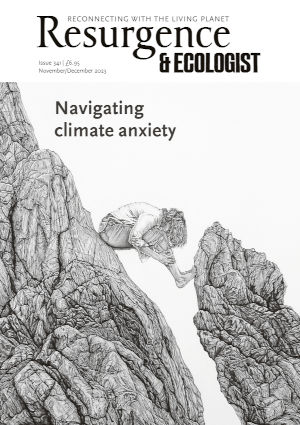I read this book on a visit to France, travelling along the leafy autoroutes of Brittany where illustrated road signs told wordless stories about the places through which we were passing. Sanctuaries for rare birds, villages turned into battlefields, industrial hubs, places to find God, and places to eat the best apples. These simple, creative signs made a long journey more interesting, bringing to life – even for just a few seconds – the countryside zooming past. It was a connection between time and place that had also been forged in the book lying on my lap, although instead of northern France, I was transported to the Camino Francés in northern Spain, an ancient 500-mile pilgrimage route, walked by the author in a time of turbulent global change.
It is a path usually walked by 300,000 people a year, but when Mary Colwell decides to follow it between lockdowns in 2020, she is virtually alone. Woven into her journey are moments of friendship and kindness as she meets locals and other travellers along the way, but for the most part hers is a journey plagued by the inescapable events of the outside world. Donald Trump blares through the television screen amidst the bleak realities of pandemic deaths, Brexit deadlines and the ongoing climate emergency. These are changing times, which, as the author retrospectively observes, will have changed even more by the time the book is printed, bound and published. So where can we look for anchorage in the tempest of modern existence? For Colwell, it is through pilgrimage – a spiritual journey of the mind, body and soul, nourished along the way by the balm of the natural landscape.
The act of walking has always been a form of therapy for writers, from Edward Thomas’s 40 miles a day to Laurie Lee’s Midsummer Morning and Raynor Winn’s modern classic The Salt Path. “I wanted to walk alone and let my thoughts synchronise with the rhythm of one step at a time,” Colwell writes. “It feels natural to face a crisis by walking.” But why a pilgrimage rather than a long-distance walk? There is no simple answer to this, and here lies the beauty of this book. It is a celebration of everything grey in a world that often demands brutal, black-and-white thinking. The pilgrimage at the heart of The Gathering Place is a journey into the murky crossover between spirituality and religion, an exploration of what it means to travel a sacred path, and a conversation about the origins of sacred spaces. As the author so beautifully writes, these pilgrim paths are like “threads of intention that spin a web of spirituality across the physical world”. She is unsure of her place within a traditionally religious world, but step by step, thought by thought, she invites us to share in a personal odyssey threaded with memories and stories from her own life. The end result is a rich tapestry full of myth, wisdom and humility, accompanied always by evocative musings on the natural world.
Although not an overly cheerful book, The Gathering Place is nonetheless enveloped in hope and sprinkled with humour. Most importantly, it is an honest homage to the complexities of living through the crises of the last few years, and the paths we all take to reconcile our existence in changing times. For Colwell, the growth of pilgrimage is “testament to the desire to re-enchant a world dulled by human misuses and excesses”. As we join her on this particular pilgrimage, we have no choice but to gently face an uncertain future together.
The Gathering Place: A Winter Pilgrimage Through Changing Times by Mary Colwell. Bloomsbury Wildlife, 2023. ISBN: 9781399400541.







